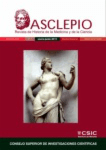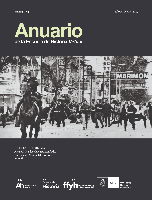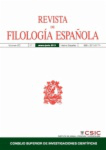
Limite-Revista de Estudios Portugueses y de la Lusofonia
Scope & Guideline
Fostering Interdisciplinary Insights into Lusophone Heritage
Introduction
Aims and Scopes
- Lusophone Literature Analysis:
The journal focuses on critical studies of literature from Portuguese-speaking countries, exploring themes, genres, and historical influences that shape their narratives. - Translation Studies:
It examines the complexities and nuances of translating Portuguese literary works, as well as the impact of translation on cultural exchange and identity. - Cultural and Linguistic Identity:
Research on the relationship between language and identity within Lusophone communities, including the role of regional dialects and historical language contact. - Interdisciplinary Approaches:
The journal encourages interdisciplinary research that intersects literature, linguistics, history, and cultural studies to provide a holistic understanding of topics related to the Lusophone world. - Historical Contextualization:
It emphasizes the importance of historical perspectives in understanding contemporary Lusophone literature and culture, often revisiting key historical figures and events. - Artistic and Critical Reviews:
The publication also includes artistic reviews and critiques of contemporary works, enhancing the dialogue between literature and other art forms.
Trending and Emerging
- Transnational and Diasporic Studies:
There is an increasing focus on the experiences and literature of Lusophone communities outside of Portugal, emphasizing migration, identity, and cultural exchange. - Contemporary Literary Trends:
Recent publications show a growing interest in contemporary authors and movements, reflecting current societal issues and new literary forms. - Intersection of Literature and Visual Arts:
Emerging research increasingly explores the relationship between literature and visual arts, including film and digital media, highlighting interdisciplinary connections. - Postcolonial Perspectives:
There is a noticeable trend towards incorporating postcolonial theory in the analysis of Lusophone literature, examining the legacies of colonialism and their impact on identity. - Gender Studies and Feminist Critique:
Recent articles indicate a rising interest in gender studies, focusing on the representation of women in Lusophone literature and the exploration of feminist themes.
Declining or Waning
- Traditional Literary Canon:
There seems to be a waning interest in the traditional literary canon, with fewer studies focusing solely on classic Portuguese authors and their works, as contemporary literature gains more attention. - Regional Literature Studies:
Research specifically centered on regional literature within Portugal has decreased, possibly overshadowed by broader themes of cultural identity and transnational connections. - Historical Linguistics:
While language studies remain relevant, there is a noticeable decline in the focus on historical linguistics, as contemporary language use and sociolinguistic approaches take precedence. - Static Cultural Heritage:
Themes related to static cultural heritage, such as traditional folklore and customs, are becoming less prominent, as the journal shifts towards dynamic cultural interactions and modern expressions. - Theoretical Linguistics:
There is a noticeable reduction in papers focused purely on theoretical linguistics, as applied linguistics and sociolinguistic themes gain more traction.
Similar Journals

Cuadernos de Ilustracion y Romanticismo
Connecting Historical Insights with Contemporary ScholarshipCuadernos de Ilustracion y Romanticismo is an esteemed open-access journal published by UNIV CADIZ, SERV PUBLICACIONES, dedicated to the exploration of the cultural, literary, and philosophical dimensions of the Enlightenment and Romantic eras. With its ISSN of 2173-0687, this journal aims to foster a deeper understanding of historical narratives and their impact on contemporary thought, making it an essential resource for researchers and students alike. Since its inception in 1991, Cuadernos de Ilustracion y Romanticismo has encouraged scholarly dialogue across various fields, as evidenced by its categorical placements in the Q4 quartile rankings across History, Philosophy, Linguistics, and Literature. Despite its emerging status, the journal holds a significant presence within the academic community, ranked within the 50th to 25th percentile across multiple Scopus categories. With its convergence covering the years from 2019 to 2024, this publication remains committed to the rigor of scholarly research while facilitating access to its rich, insightful content, essential for nurturing the future of humanities scholarship.

Asclepio-Revista de Historia de la Medicina y de la Ciencia
Unveiling the Past to Illuminate the Future of Medicine and ScienceAsclepio-Revista de Historia de la Medicina y de la Ciencia, published by the Consejo Superior de Investigaciones Científicas (CSIC) in Spain, stands as a vital open-access journal dedicated to the interdisciplinary exploration of the history of medicine and science. Since its inception in 1969, the journal has evolved through various converged years, fostering critical discourse and dissemination of scholarly work till 2024. This journal holds a notable position in its field, classified within the Q3 category in History and Philosophy of Science, and ranks 141 out of 223 in Scopus, underscoring its relevance and contribution to academic research. With an unwavering commitment to open access since 1995, Asclepio provides facile access to its content, empowering researchers, professionals, and students alike to delve into the rich historical narratives that shape modern medical and scientific practices. The editorial office is located in Madrid at C/VITRUVIO 8, further enhancing its accessibility for local and international scholars.

Theleme-Revista Complutense de Estudios Franceses
Unlocking the Richness of French Language and LiteratureTheleme-Revista Complutense de Estudios Franceses is a distinguished academic journal published by UNIV COMPLUTENSE MADRID, SERVICIO PUBLICACIONES, dedicated to the exploration of French studies within the fields of linguistics and literature. With an ISSN of 1139-9368 and an E-ISSN of 1989-8193, this journal has proudly maintained its Open Access policy since 1992, ensuring that scholarly research is accessible to a global audience. Based in Spain, the journal is committed to advancing knowledge and fostering discussion in French linguistic and literary theory, as evidenced by its publication history from 2019 to 2024. Despite its current classification in the Q4 quartile for both Linguistics and Literature and Literary Theory as of 2023, Theleme is positioned to grow in its academic influence, reflecting trends in interdisciplinary research. The journal’s rankings in Scopus underscore its unique contributions and the importance of its discourse in the arts and humanities. Researchers, professionals, and students are encouraged to engage with Theleme as a resource for innovative ideas and comprehensive studies that navigate the rich landscape of French language and literature.

Anuario de la Escuela de Historia Virtual
Fostering Innovative Research in Historical ContextsAnuario de la Escuela de Historia Virtual is a distinguished academic journal published by the Universidad Nacional de Córdoba, Facultad de Filosofía y Humanidades. With its focus on the field of history, this peer-reviewed journal aims to foster scholarly discussion and disseminate innovative research that contributes to the understanding of historical contexts and narratives. Since transitioning to an Open Access model in 2010, it has greatly increased accessibility for researchers, professionals, and students, thereby promoting a greater exchange of knowledge across linguistic and geographical boundaries. Published under the ISSN 1853-7049, the journal provides invaluable insights into historical analysis, methodologies, and interdisciplinary approaches, ensuring its relevance in contemporary academic discourse. Its commitment to high-quality, impactful research positions it as a vital resource within the historical scholarship landscape.

Cadernos de Letras da UFF
Cultivating Knowledge in Literature and LanguageCadernos de Letras da UFF is a prominent academic journal published by the Department of History at the Federal University of Fluminense in Brazil. Since its transition to Open Access in 2014, it has fostered a spirit of collaboration and dissemination in the field of Literature and Linguistics, welcoming contributions that explore various aspects of literary studies, historical literature contexts, and linguistic phenomena. With a commitment to quality and academic rigor, the journal serves as a vital resource for scholars, practitioners, and students engaged in the humanities. The journal is dedicated to the advancement of knowledge through innovative research and critical analyses, making it an essential platform for sharing ideas with a global audience. The journal is based in Niterói, RJ, Brazil, and is indexed in various academic databases, enhancing its visibility and impact within the scholarly community.

Minerva-Revista de Filologia Clasica
Exploring the depths of linguistics and literature.Minerva-Revista de Filologia Clasica, an esteemed academic journal published by the Universidad de Valladolid, is a pivotal resource in the fields of Classics, Linguistics, and Literature. With its ISSN 0213-9634 and E-ISSN 2530-6480, this journal has been championing open access since 2017, making high-quality research accessible to a global audience. Based in Valladolid, Spain, Minerva is dedicated to the exploration and dissemination of scholarly work related to classical philology, offering a platform for the exchange of ideas among researchers, educators, and students alike. Recognized in the 2023 category quartiles as Q3 in Classics and Q4 in Linguistics and Language, this journal provides valuable insights and contributes significantly to its fields, allowing authors and readers to engage with important discussions and innovative perspectives. As the academic landscape evolves, Minerva continues to adapt, fostering a vibrant community committed to the advancement of knowledge in antiquity and its linguistic dimensions.

Alpha-Revista de Artes Letras y Filosofia
Unveiling New Horizons in Arts and LettersAlpha-Revista de Artes Letras y Filosofia is an esteemed academic journal published by Universidad de Los Lagos in Chile, focusing on the dynamic fields of arts, letters, and philosophy. Since its inception in 2008, the journal has fostered interdisciplinary dialogue and innovative research, contributing to the evolving discourse in the humanities. With an ISSN of 0716-4254 and an E-ISSN of 0718-2201, it stands out in the Q3 quartile for Arts and Humanities (miscellaneous) as of 2023, ranking #108 out of 173 in the Scopus metrics, underscoring its significance within the academic community with a 37th percentile ranking. Though it operates as a subscription-based journal, it ensures accessibility to a broad audience, thus facilitating the exchange of knowledge among researchers, professionals, and students alike. The editorial board actively invites contributions that engage critically with cultural, philosophical, and artistic frameworks, thereby advancing understanding and appreciation of diverse perspectives in the humanities.

REVISTA DE FILOLOGIA ESPANOLA
Connecting Scholars Through Open Access ResearchREVISTA DE FILOLOGIA ESPANOLA is a distinguished academic journal dedicated to the fields of linguistics and literature, published by the CONSEJO SUPERIOR INVESTIGACIONES CIENTIFICAS (CSIC) since 1954, and has been an Open Access journal since its inception. Situated in Madrid, Spain, this journal has emerged as a crucial platform for the dissemination of scholarly research, with notable rankings including Q2 in Linguistics and Language and Q1 in Literature and Literary Theory as of 2023. The journal's commitment to fostering academic dialogue is reflected in its impressive Scopus rankings, including a 79th percentile in the Arts and Humanities for Literature and Literary Theory. Covering a wide range of topics from linguistic theory to literary critique, REVISTA DE FILOLOGIA ESPANOLA is essential reading for researchers, professionals, and students alike, providing valuable insights and cutting-edge research in the ever-evolving landscape of Spanish philology.

Revista de Cancioneros Impresos y Manuscritos
Celebrating the Intersection of Music and CultureRevista de Cancioneros Impresos y Manuscritos is an esteemed academic journal published by UNIV ALICANTE, dedicated to the field of Literary and Cultural Studies, with a particular focus on the history and analysis of printed and manuscript songbooks. Since its inception, this Open Access journal has been committed to promoting scholarly research and collaboration, allowing for unrestricted access to knowledge that contributes to the vibrant discourse surrounding literature, linguistics, and cultural heritage. The journal boasts an impressive reputation, achieving a Q2 ranking in both Library and Information Sciences and Linguistics and Language, as well as a Q1 ranking in Literature and Literary Theory as of 2023. With a significant impact factor and current Scopus rankings reflecting its scholarly influence, the journal serves as a critical platform for researchers, professionals, and students alike to publish and engage with pioneering scholarship in these dynamic fields. Since its transition to open access in 2012, the journal has fostered a community of contributors and readers dedicated to exploring the multifaceted dimensions of song literature.

REVISTA CHILENA DE LITERATURA
Elevating the conversation in contemporary literature.REVISTA CHILENA DE LITERATURA, published by Universidad de Chile, Facultad de Filosofía y Humanidades, is a premier open-access journal that has been at the forefront of literary scholarship since its inception in 2004. With its ISSN 0718-2295, the journal focuses on a wide array of topics within the field of literature and literary theory, striving to foster intellectual discourse and innovation. It has gained notable recognition, reflected in its Q2 category ranking in 2023, positioning it among the top journals in its field within the Scopus database, where it ranks #513 out of 1106 journals, placing it in the 53rd percentile. Hailing from Chile, the journal also serves as a vital platform for researchers and students to disseminate their work, enhancing the global dialogue in literature. With a history of convergence from 2007 to 2023, REVISTA CHILENA DE LITERATURA is committed to advancing literary research and its implications in contemporary contexts, making it an essential resource for anyone engaged in literary studies.